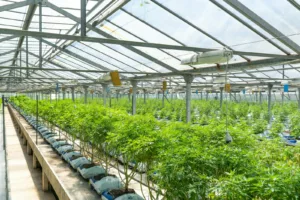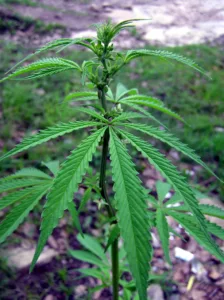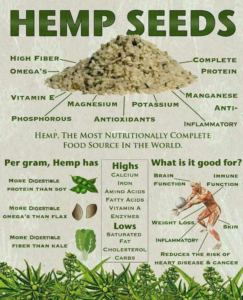“Hemp Science: Exploring the Healing Properties of Hemp” is an article that delves into the various uses and benefits of hemp as a natural remedy. The article highlights the growing interest in hemp as a potential solution for various health conditions and explores its potential as an alternative treatment option. From its role in Chinese medicine to its potential in alleviating symptoms of depression and reducing inflammation, this article offers a comprehensive overview of the healing properties of hemp. With its scientific approach and focus on evidence-based research, this article seeks to inform readers about the potential benefits of incorporating hemp into their wellness routine.
Introduction
Hemp, a versatile plant with a rich history and numerous health benefits, has gained significant attention in recent years. From its cultivation to its chemical composition and potential health advantages, hemp has become a subject of interest in both traditional and modern medicine. This article aims to provide a comprehensive overview of hemp, discussing its definition, history, cultivation, chemical composition, health benefits, integration into traditional medicine, various hemp-based products, ongoing research, legality, regulation, and references.

What is Hemp?
Definition
Hemp, scientifically known as Cannabis sativa, is a plant species belonging to the Cannabaceae family. Unlike its close relative, marijuana, hemp contains minimal amounts of tetrahydrocannabinol (THC), the psychoactive component responsible for inducing a “high” sensation. The cultivation of hemp for industrial purposes revolves around its versatile stalk, seeds, and fibers, which have various commercial applications.
History
Hemp has a long history dating back thousands of years. Ancient civilizations in China, India, and Egypt utilized hemp for various purposes, such as making textiles, ropes, and paper. The plant played a crucial role in maritime trade, with sailors using hemp fibers for sails and ropes. Hemp cultivation spread across Europe during the Middle Ages, and it eventually made its way to North America through European settlers.
Benefits
Hemp offers numerous benefits, making it an attractive crop for various industries. Its versatile fibers can be used to manufacture durable textiles, biodegradable plastics, construction materials, and eco-friendly paper products. Hemp seeds are a rich source of protein, essential fatty acids, and vitamins, making them a valuable addition to the human diet. Additionally, hemp cultivation requires fewer pesticides and herbicides compared to other crops, making it an environmentally friendly option.

Hemp Cultivation
Growing Conditions
Hemp thrives in temperate climates and can be cultivated in diverse geographical regions. The plant prefers well-drained soil with a pH range of 6 to 7.5. It requires ample sunlight, with a minimum of six hours of direct sunlight per day. Hemp is typically planted in the late spring or early summer, and it has a relatively short growing period of about 70 to 90 days, depending on the variety.
Harvesting
Hemp plants are typically harvested when the female plants produce mature seeds. This occurs roughly 120 days after planting. Harvesting involves cutting the stalks at the base and gathering them into bundles. The bundles are then left in the field to dry for a period of time, allowing the leaves to gradually fall off. Once dried, the hemp stalks can be processed to extract the desired components.
Processing
After the drying process, hemp stalks undergo various processing techniques to extract valuable components. The fibers can be separated from the stalks through a process called “retting,” which involves exposing them to moisture for a specific period. This allows the fibers to separate from the woody inner core of the stalks. The extracted fibers can then be processed further to be used in the production of textiles, paper, and other products. Hemp seeds can also be processed to obtain oil, while the leaves and flowers can be used for further extraction of cannabinoids.

Chemical Composition of Hemp
Cannabinoids
Hemp contains various cannabinoids, including cannabidiol (CBD) and cannabigerol (CBG). CBD is the most well-known and extensively researched cannabinoid found in hemp. It has gained popularity for its potential therapeutic benefits, such as pain management, anxiety relief, and anti-inflammatory effects. CBG, a lesser-known cannabinoid, is also being studied for its potential health benefits.
Terpenes
Terpenes are aromatic molecules found in hemp and other plants. They contribute to the distinctive smell and flavor of hemp products. Terpenes also play a role in the potential health benefits of hemp, as they may have anti-inflammatory, antimicrobial, and neuroprotective properties.
Flavonoids
Flavonoids are a diverse group of compounds found in various plants, including hemp. They contribute to the plant’s color and may have antioxidant and anti-inflammatory properties. Some flavonoids found in hemp, such as quercetin and apigenin, are being studied for their potential health benefits.
Other Compounds
In addition to cannabinoids, terpenes, and flavonoids, hemp contains various other compounds, including vitamins, minerals, essential fatty acids, and antioxidants. These compounds contribute to the overall health benefits of hemp and its potential therapeutic properties.
Health Benefits of Hemp
Pain Management
Hemp-derived products, such as CBD oil, have shown promise in managing chronic pain. CBD interacts with the endocannabinoid system, which is involved in regulating pain perception. Studies have found that CBD may help alleviate pain associated with conditions such as arthritis, multiple sclerosis, and neuropathic pain.
Anxiety and Depression Relief
CBD has also demonstrated potential in reducing symptoms of anxiety and depression. It interacts with serotonin receptors in the brain, which are involved in regulating mood and emotional well-being. Studies suggest that CBD may have anxiolytic and antidepressant effects, making it a promising option for individuals seeking natural alternatives to traditional medications.
Neuroprotective Properties
Research has shown that CBD may have neuroprotective properties, meaning it may help protect the brain from damage and degeneration. CBD has been studied for its potential therapeutic effects in neurodegenerative diseases such as Alzheimer’s disease, Parkinson’s disease, and multiple sclerosis.
Anti-inflammatory Effects
Both CBD and other compounds present in hemp, such as terpenes and flavonoids, have exhibited anti-inflammatory effects. Chronic inflammation is linked to various health conditions, including autoimmune diseases, cardiovascular disease, and certain types of cancer. The anti-inflammatory properties of hemp may contribute to its potential therapeutic benefits in managing these conditions.
Skin Health
Topical application of hemp-derived products, such as CBD-infused creams and balms, has gained popularity in skincare. CBD has shown potential in managing various skin conditions, including acne, eczema, psoriasis, and dermatitis. It may help reduce inflammation, regulate sebum production, and promote overall skin health.
Digestive Health
Hemp seeds are rich in dietary fiber, which plays a crucial role in digestive health. Consuming an adequate amount of fiber can help regulate bowel movements, prevent constipation, and promote a healthy digestive system. Additionally, hemp seeds contain essential fatty acids, such as omega-3 and omega-6, which are beneficial for gut health.
Heart Health
The omega-3 fatty acids found in hemp seeds have been linked to heart health benefits. These fatty acids may help reduce the risk of cardiovascular disease by lowering blood pressure, reducing inflammation, and improving cholesterol levels. Regular consumption of hemp seeds or hemp oil as part of a balanced diet may contribute to overall heart health.
Cancer Treatment Support
While more research is needed, preliminary studies suggest that certain compounds found in hemp, such as cannabinoids and flavonoids, may have potential in supporting cancer treatment. CBD has shown promise in reducing chemotherapy-induced nausea and vomiting, while other cannabinoids are being studied for their potential anti-cancer properties.
Hemp and Traditional Medicine
Traditional Uses
Hemp has been used in traditional medicine systems such as Chinese medicine for centuries. It has been utilized to address various health conditions, including pain, inflammation, digestive issues, and skin disorders. Traditional medicine emphasizes the plant’s therapeutic potential and its ability to promote overall well-being.
Integration into Modern Medicine
With the growing interest in hemp and its potential health benefits, modern medicine is exploring ways to integrate hemp-derived products into treatment protocols. Clinical trials and research studies are being conducted to evaluate the efficacy and safety of these products in managing various health conditions. As evidence continues to accumulate, healthcare professionals may incorporate hemp-based products as complementary or alternative therapies.
Hemp-Based Products
CBD Oil
CBD oil is one of the most popular hemp-based products on the market. It is derived from hemp plants and contains varying concentrations of CBD. CBD oil can be consumed orally, added to food and beverages, or applied topically. Its potential health benefits make it a sought-after option for individuals seeking natural remedies for pain, anxiety, and other conditions.
Hemp Seed Oil
Hemp seed oil is extracted from the seeds of the hemp plant. It is rich in essential fatty acids, including omega-3 and omega-6, and can be incorporated into the diet as a nutritional supplement. Hemp seed oil is also used in skincare products for its moisturizing and nourishing properties.
Hemp Fiber
Hemp fibers are renowned for their strength and durability. They can be used in various industries, including textiles, construction, and automotive manufacturing. Hemp fiber is considered an eco-friendly alternative to synthetic fibers due to its sustainable cultivation practices and low environmental impact.
Hemp Protein Powder
Hemp protein powder is derived from hemp seeds and is a rich source of plant-based protein. It contains all nine essential amino acids, making it a complete protein source. Hemp protein powder is popular among athletes, vegans, and individuals looking to increase their protein intake.
Research and Clinical Trials
Current Studies and Findings
Numerous studies are underway to explore the potential health benefits of hemp and its derivatives. Researchers are investigating the therapeutic properties of cannabinoids, terpenes, and other compounds found in hemp for various health conditions, including epilepsy, chronic pain, anxiety disorders, and cancer. Preliminary findings suggest that hemp-derived products may offer promising treatment options, but further research is needed to establish their efficacy and safety.
Potential Future Applications
As research on hemp continues to expand, there is potential for the development of new treatment options. Scientists are exploring the potential use of hemp-derived compounds in targeted drug delivery systems, personalized medicine, and novel therapies for neurodegenerative diseases, cardiovascular conditions, and inflammatory disorders. The continued exploration and understanding of hemp’s chemical composition may open doors to new applications in the future.
Legality and Regulation
Legal Status of Hemp
The legal status of hemp varies across jurisdictions. In many countries, hemp is legally cultivated for industrial purposes, provided it contains no more than a specified amount of THC, typically 0.3% or less. However, regulations regarding the cultivation, processing, and sale of hemp-derived products, particularly those containing CBD, can vary. It is important to consult local laws and regulations to ensure compliance.
Regulatory Framework
Regulatory frameworks for hemp and hemp-derived products are evolving as the industry grows. Regulatory bodies are responsible for establishing guidelines and standards to ensure product safety, quality, and proper labeling. This includes testing for contaminants, accurate labeling of CBD content, and compliance with good manufacturing practices. Consumers should look for products that adhere to these regulations to ensure they are purchasing high-quality and safe hemp-based products.
Quality Control and Safety
Due to the increasing demand for hemp-derived products, it is essential to prioritize quality control and safety measures. Reputable companies should have third-party testing to confirm the potency and purity of their products. Testing can verify that products are free from harmful contaminants and meet regulatory standards. Consumers should look for transparent companies that provide batch-specific certificates of analysis to ensure the quality and safety of the products they purchase.
References
- Cox L, et al. (2019). The Art of Compounding Cannabinoids: An Update on the Advancements in Plant-Based Medicine. Journal of Preventive Medicine and Holistic Health.
- Russo E, et al. (2011). Cannabis for migraine treatment: the once and future prescription? An Historical and Scientific Review.
- Timmermann BN, et al. (2019). Flavonoids as Medicinal Agents: Recent Advances. In: Natural Products in Medicinal Chemistry.
- WHO Expert Committee on Drug Dependence. Cannabidiol (CBD) Pre-Review Report.
- U.S. Food and Drug Administration. What You Need to Know (And What We’re Working to Find Out) About Products Containing Cannabis or Cannabis-derived Compounds, Including CBD.
- European Monitoring Centre for Drugs and Drug Addiction. Medical Cannabis in Europe: An Overview.
Please note that the references provided are for informational purposes and do not constitute medical advice. Consult with a healthcare professional before using hemp-based products or incorporating them into your healthcare routine.

